专题02Units4-6复习课件【考点串讲】-七年级英语下学期期末考点大串讲(人教版)
文档属性
| 名称 | 专题02Units4-6复习课件【考点串讲】-七年级英语下学期期末考点大串讲(人教版) |  | |
| 格式 | pptx | ||
| 文件大小 | 5.4MB | ||
| 资源类型 | 试卷 | ||
| 版本资源 | 人教新目标(Go for it)版 | ||
| 科目 | 英语 | ||
| 更新时间 | 2024-05-24 06:35:54 | ||
图片预览


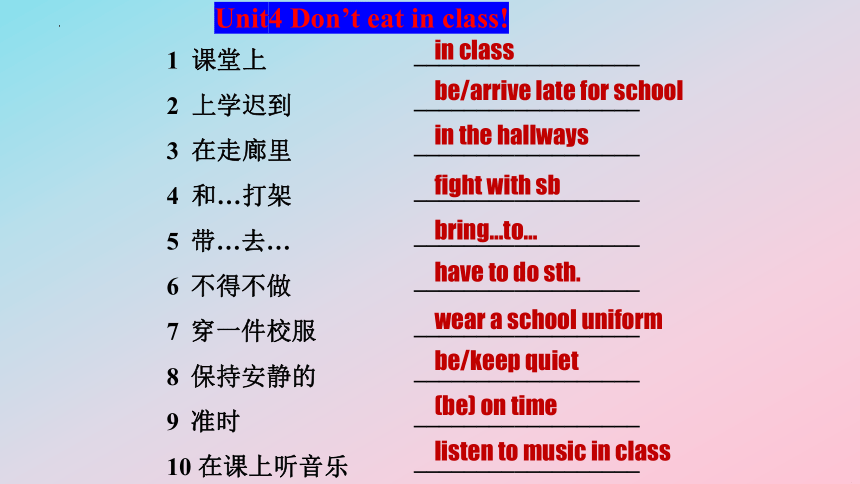
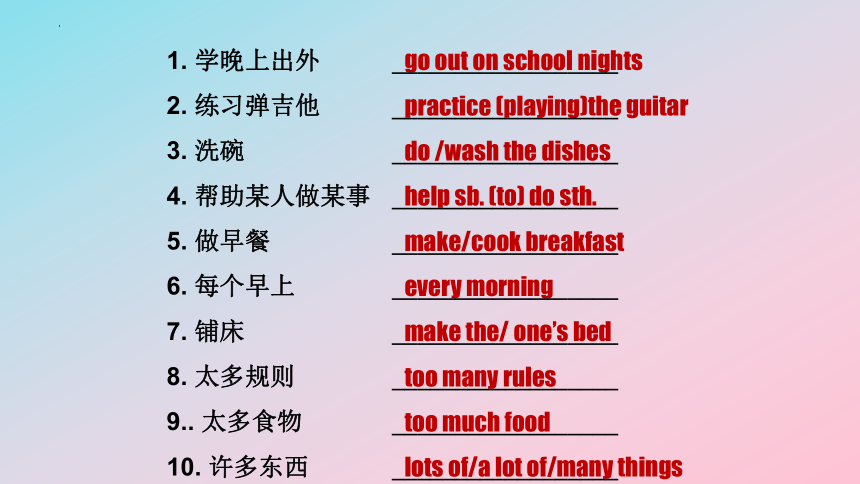
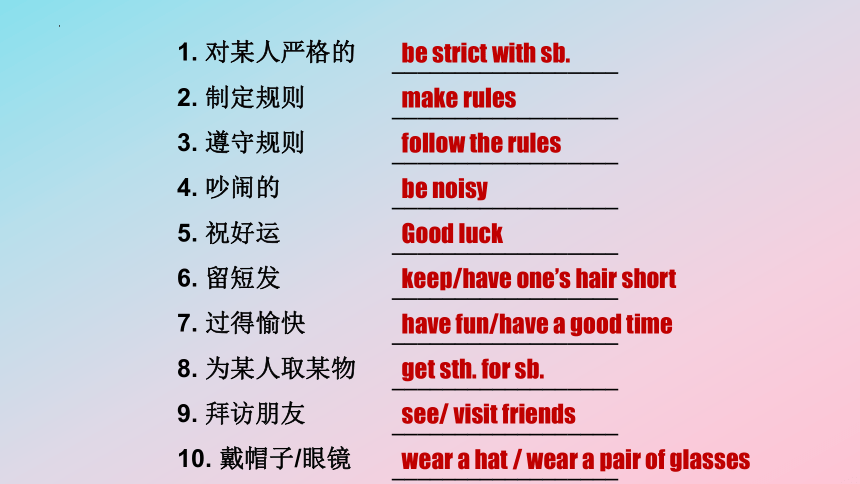
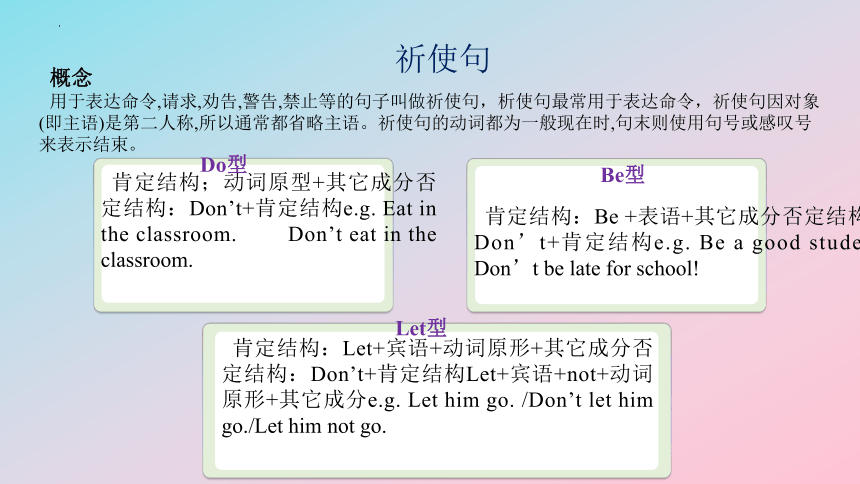
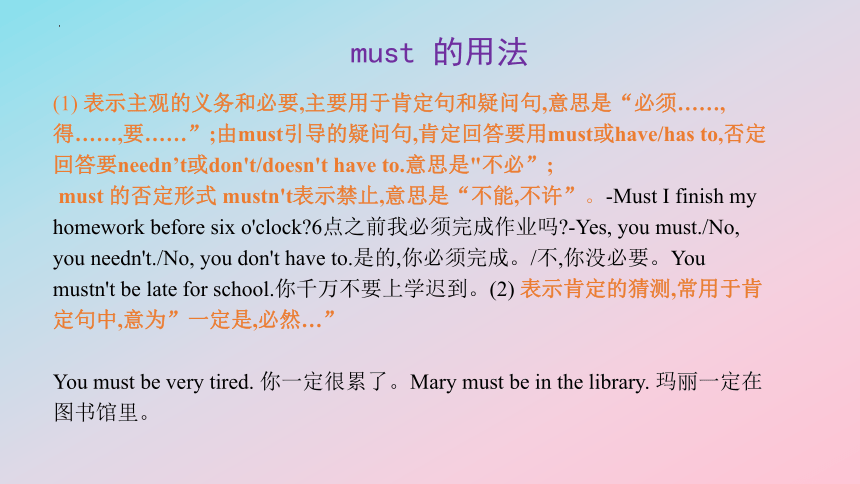

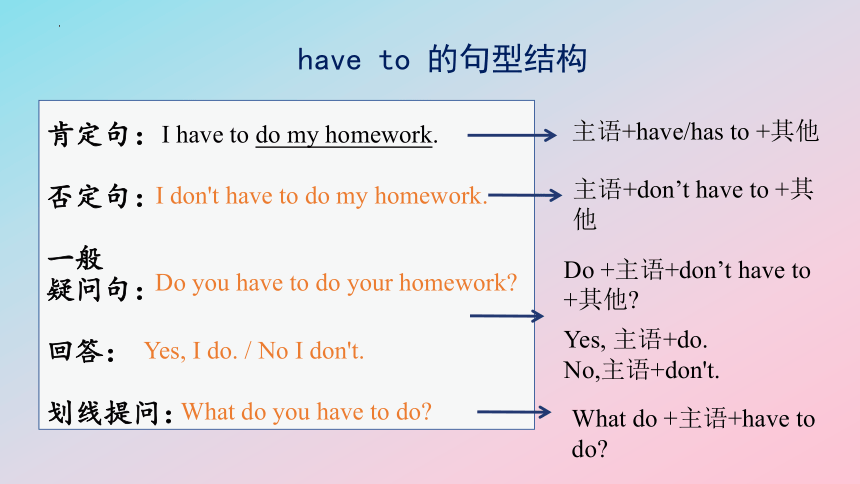
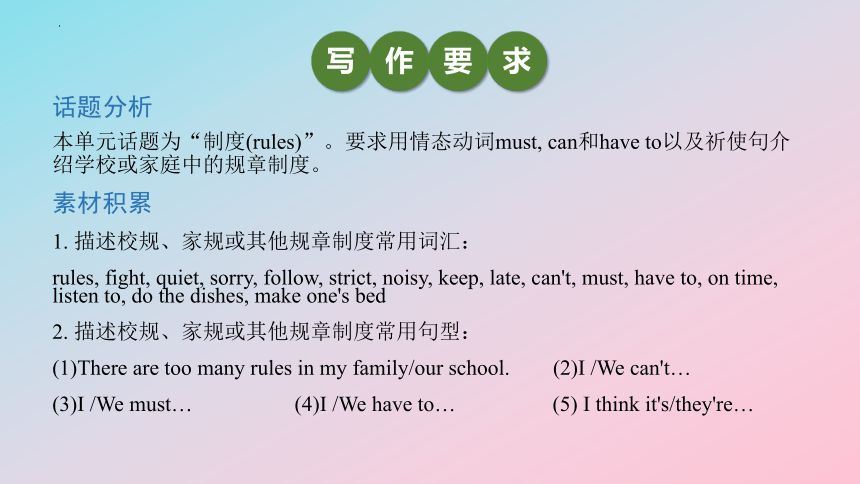
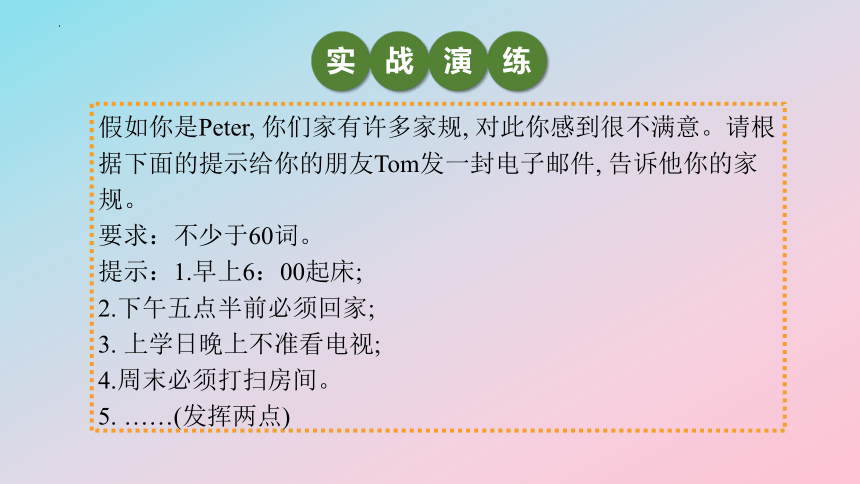
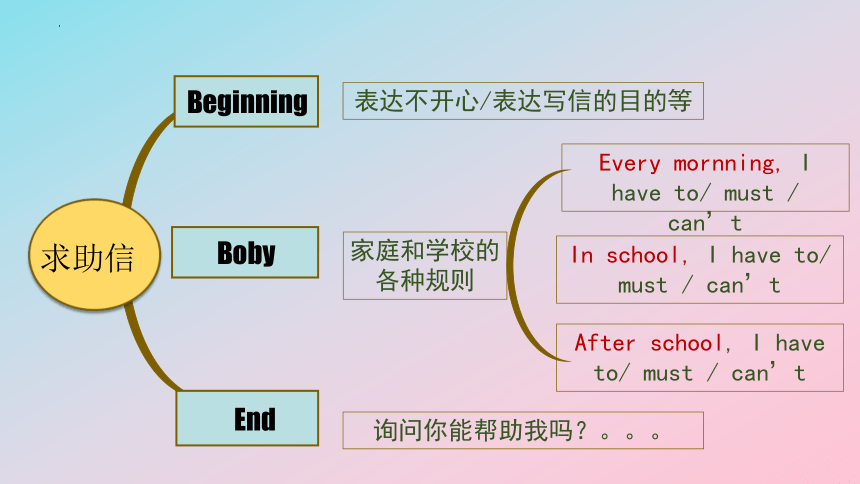
文档简介
(共49张PPT)
人教版七年级下期末考点串讲
Unit4-Unit6
目
录
CONTENT
Unit4-6 重点短语
Unit4 单元语法梳理和写作
Unit5 单元语法梳理和写作
Unit6 现在进行时和写作
2
3
4
1
5
Unit4-6重点语法真题感悟
1 课堂上
2 上学迟到
3 在走廊里
4 和…打架
带…去…
不得不做
穿一件校服
保持安静的
准时
在课上听音乐
in the hallways
fight with sb
have to do sth.
be/arrive late for school
bring…to…
wear a school uniform
be/keep quiet
(be) on time
listen to music in class
in class
__________________
__________________
__________________
__________________
__________________
__________________
__________________
__________________
__________________
__________________
Unit4 Don’t eat in class!
1. 学晚上出外
2. 练习弹吉他
3. 洗碗
4. 帮助某人做某事
5. 做早餐
6. 每个早上
7. 铺床
8. 太多规则
9.. 太多食物
10. 许多东西
go out on school nights
practice (playing)the guitar
do /wash the dishes
help sb. (to) do sth.
make/cook breakfast
every morning
make the/ one’s bed
too many rules
too much food
lots of/a lot of/many things
__________________
__________________
__________________
__________________
__________________
__________________
__________________
__________________
__________________
__________________
1. 对某人严格的
2. 制定规则
3. 遵守规则
4. 吵闹的
5. 祝好运
6. 留短发
7. 过得愉快
8. 为某人取某物
9. 拜访朋友
10. 戴帽子/眼镜
be strict with sb.
make rules
follow the rules
be noisy
Good luck
keep/have one’s hair short
have fun/have a good time
get sth. for sb.
see/ visit friends
wear a hat / wear a pair of glasses
__________________
__________________
__________________
__________________
__________________
__________________
__________________
__________________
__________________
__________________
祈使句
概念
用于表达命令,请求,劝告,警告,禁止等的句子叫做祈使句,析使句最常用于表达命令,祈使句因对象(即主语)是第二人称,所以通常都省略主语。祈使句的动词都为一般现在时,句末则使用句号或感叹号来表示结束。
肯定结构;动词原型+其它成分否定结构:Don’t+肯定结构e.g. Eat in the classroom. Don’t eat in the classroom.
Do型
肯定结构:Let+宾语+动词原形+其它成分否定结构:Don’t+肯定结构Let+宾语+not+动词原形+其它成分e.g. Let him go. /Don’t let him go./Let him not go.
Let型
肯定结构:Be +表语+其它成分否定结构:Don’t+肯定结构e.g. Be a good student! Don’t be late for school!
Be型
(1) 表示主观的义务和必要,主要用于肯定句和疑问句,意思是“必须……,得……,要……”;由must引导的疑问句,肯定回答要用must或have/has to,否定回答要needn’t或don't/doesn't have to.意思是"不必”;
must 的否定形式 mustn't表示禁止,意思是“不能,不许”。-Must I finish my homework before six o'clock 6点之前我必须完成作业吗 -Yes, you must./No, you needn't./No, you don't have to.是的,你必须完成。/不,你没必要。You mustn't be late for school.你千万不要上学迟到。(2) 表示肯定的猜测,常用于肯定句中,意为”一定是,必然…”
You must be very tired. 你一定很累了。Mary must be in the library. 玛丽一定在图书馆里。
must 的用法
have to 的用法
表示客观需要做的事情,意思是“必须,不得不"。使用have lo时应注意的几点:
(1) have to后接动词原形,意为"必须做………;不得不做……”You have to wash my clothes first,你必须先洗我的衣服。
(2) have to有人称,数和时态的变化,其第三人称单数形式为has to.She has to help her mom make dinner,她不得不帮她妈妈做晚饭。
(3) 含有have to,has to的句子需分别借助助动词 do,does 构成疑问句或否定句。
Do they have to go home now 他们得现在回家吗
You don’t have to go if you don't want to.如果你不想去,你就不必去。
have to 的句型结构
肯定句:
否定句:
一般
疑问句:
回答:
划线提问:
I have to do my homework.
I don't have to do my homework.
Do you have to do your homework
Yes, I do. / No I don't.
What do you have to do
主语+have/has to +其他
主语+don’t have to +其他
Do +主语+don’t have to +其他
Yes, 主语+do.
No,主语+don't.
What do +主语+have to do
写
作
要
求
1. 描述校规、家规或其他规章制度常用词汇:
rules, fight, quiet, sorry, follow, strict, noisy, keep, late, can't, must, have to, on time, listen to, do the dishes, make one's bed
2. 描述校规、家规或其他规章制度常用句型:
(1)There are too many rules in my family/our school. (2)I /We can't…
(3)I /We must… (4)I /We have to… (5) I think it's/they're…
话题分析
本单元话题为“制度(rules)”。要求用情态动词must, can和have to以及祈使句介绍学校或家庭中的规章制度。
素材积累
实
战
演
练
假如你是Peter, 你们家有许多家规, 对此你感到很不满意。请根据下面的提示给你的朋友Tom发一封电子邮件, 告诉他你的家规。
要求:不少于60词。
提示:1.早上6:00起床;
2.下午五点半前必须回家;
3. 上学日晚上不准看电视;
4.周末必须打扫房间。
5. ……(发挥两点)
Beginning
End
Boby
求助信
表达不开心/表达写信的目的等
家庭和学校的各种规则
询问你能帮助我吗?。。。
Every mornning, I have to/ must / can’t
In school, I have to/ must / can’t
After school, I have to/ must / can’t
家庭和学校的各种规则
First of all, I have to/ must / can’t
Second/ In addition, I have to/ must / can’t
Third/ Last but not least/Finally, I have to/ must / can’t
范
文
展
示
Dear Tom,
Let me tell you about my family rules. I think there are too many rules in my family. First, I have to get up at 6: 00 in the morning. Second, after school I must go home before 5: 30 because I have to do my homework. Third, I can't watch TV on school nights. Finally, I have to clean my room on weekends. I must wash dishes after dinner. I have to go to bed before ten. I think they are very terrible. I don't like them.
Yours,
Peter
1. ___________________ 欢迎来到
2. ___________________ 有一点
3. ___________________ 来自
4. ___________________用两条腿走路
5. __________________ 整天
6. __________________ 入睡
7. __________________黑白相间
8. ___________________ 南非
welcome to
kind of
be from/come from
walk on two legs
all day
go to sleep
black and white
south Africa
短语
Unit5 Why do you like pandas
9.__________________ …的象征
10. ___________________ 好运
11. ___________________ 迷路
12. ___________________处于危险
13. __________________ 砍伐
14. __________________ 失去家园
15. ______________________ 象牙制品
短语
the/a symbol of
good luck
get lost
be in danger
cut down
lose one’s home
things made of ivory
Why do you like pandas Because they’re kind of interesting.
Why does John like koalas Because they’re very cute.
Why don’t you like tigers Because they’re really scary.
Where are lions from They’re from South Africa.
Read and observe this chart.
Grammar focus
why和where引导的特殊疑问句是怎么构成的?
由特殊疑问词+一般疑问句构成。
Why do you like pandas Because they’re kind of interesting.
Why does John like koalas Because they’re very cute.
Why don’t you like tigers Because they’re really scary.
Where are lions from They’re from South Africa.
Read and observe this chart.
Grammar focus
why引导的特殊疑问句对什么提问?怎么回答?
对原因提问,用because回答。
Why do you like pandas Because they’re kind of interesting.
Why does John like koalas Because they’re very cute.
Why don’t you like tigers Because they’re really scary.
Where are lions from They’re from South Africa.
Read and observe this chart.
Grammar focus
why引导的特殊疑问句对什么提问?怎么回答?
对原因提问,用because回答。
【拓展】其他常见的特殊疑问词(组)及其用法:
what 对姓名、物品、事件等提问 What’s your name 你叫什么名字?
how 对身体状况、方式等提问 How is your mother 你妈妈身体怎样
who 对人进行提问 Who is the girl 这个女孩是谁
when 对时间进行提问 When do you get up 你什么时候起床
whose 对某物的所属者进行提问 Whose book is this 这是谁的书
how old 对年龄进行提问 How old is your father 你爸爸多大了
what color 对颜色进行提问 What color is your ruler 你的尺子是什么颜色
Grammar focus
Why do you like pandas Because they’re kind of interesting.
Why does John like koalas Because they’re very cute.
Why don’t you like tigers Because they’re really scary.
Where are lions from They’re from South Africa.
Read and observe this chart.
Grammar focus
在谈论一类动物时,要用名词复数表示种类,在表达中,要注意主谓的单复数形式前后一致。
Why do you like pandas Because they’re kind of interesting.
Why does John like koalas Because they’re very cute.
Why don’t you like tigers Because they’re really scary.
Where are lions from They’re from South Africa.
Read and observe this chart.
Grammar focus
形容词是表示人或事物属性或特征的词,一般修饰名词或代词,在句中作定语或表语。
My father is busy.
The tiger looks very scary.
be动词(am/is/are)
感官动词
look
smell
sound
feel
taste
形容词作表语,常位于系动词(be, look, sound,feel等)之
后,构成系表结构,说明主语的情况。
Grammar focus
It’s a beautiful giraffe.
It’s a cute koala.
It’s a scary lion.
形容词作定语,常用于所修饰的名词或代词之前。
形容词
名词
Grammar focus
Why do you like pandas Because they’re kind of interesting.
Why does John like koalas Because they’re very cute.
Why don’t you like tigers Because they’re really scary.
Where are lions from They’re from South Africa.
Read and observe this chart.
Grammar focus
程度副词表示程度,常用来修饰形容词和副词
This is Becky. Isn’t she beautiful She is from Africa. She is twelve years old. I like Becky because she is smart and friendly. She lives in Blackwood Zoo.
Read the short passage.
name
where
age
why
live
If you describe an animal, what things will you mention
name
where
age
reason
live
This is…/Her/His name is… /She/He is called…
He/She is from…/comes from…/…is his/her hometown/…was born in…/…birthplace is in…
He/She is …years old/is aged…/with the age of…
I like…because…is…/can/…also…
Now she/he lives at/in…
What sentences can we use to make a better introduction
What is your favorite animal
Beginning
I like... best.
My favorite animal is...
Supporting
details
Closing
Structure
name
where
age
reason
live
His/Her name is...
He/She’s /They’re from...
He/She’s... years old.
He/She’s /They’re +形容词
He/She lives... now.
cute, lazy, fun, smart, beautiful, scary, shy, interesting, friendly, really, kind of, be from, China
Words and expressions
I like... best./My favorite animal is...His/Her name is...
He/She’s... years old.He/She’s /They’re +形容词
He/She’s /They’re from... He/She lives... now./ He/She eats...He/She likes... because...I like... because...
Sentences and patterns
素材准备
有关动物的佳句
Love me, love my dog. 爱屋及乌。
Every dog has his day. 人人皆有得意时。
An old horse knows the way. 老马识途。
Kill two birds with one stone. 一箭双雕。
Birds of a feather flock together. 物以类聚,人以群分。
It rained cats and dogs. 下了倾盆大雨。
素材准备
Sample
My favorite animal is a panda in Beijing Zoo. I call her Beibei. Isn’t she cute She is from China and she is five years old. She likes to eat and sleep a lot. I like Beibei because she is very friendly and cute. She is not shy at all! Lots of people go to see her every day because she is so beautiful.What is your favorite animal
使用一般现在时态,注意人称的单复数与谓语动词的搭配要一致
key phrases
1.看报纸
2. 喝茶
3.电视节目
4.做粽子
5. 端午节
6.与某人住在一起
7.看龙舟比赛
8.希望做某事
9.为考试而学习
10.听起来不错
read a newspaper
drink tea
TV show
make zongzi
Dragon Boat Festival
live with sb
watch the boat races
wish to do sth
study for the test
sound good
Unit6 I’m watching TV.
11.访谈节目
12.打扫房间
13.用电脑
14.看电影
15. 出去吃饭
16.把......读给某人听
17. 没什么事。
19.任何其他的夜晚
20. 通过电话与……交谈
21.想念某人的家人
talk show
clean the room
use the computer
go to the movies
eat out
read...to sb.
not much
any other night
talk on the phone to sb.
miss one's family
-Jenny, what are you doing
-I’m watching TV.
现在进行时
Grammar
are doing
watching TV
现在进行时:表示说话瞬间正在进行或发生的动作。
现在进行时的构成: am / is / are + v.-ing
现在进行时:
表示说话瞬间正在进行或发生的动作。
现在进行时的构成:
am / is / are + v.-ing(现在分词)
Grammar
What are you doing I’m watching TV.
What’s she doing She’s washing her clothes.
What are they doing They’re listening to a CD.
Are you doing your homework Yes, I am./No, I’m not. I am cleaning my room.
Is he reading a newspaper Yes, he is./No, he isn’t. He’s playing basketball.
Are they using the computer Yes, they are./No, he aren’t. They’re exercising.
现在进行时
肯定句式: 主+ ______________________+其他.
否定句式: 主+am/is/are+ ______+doing+其他.
疑问句式:__________+主+doing+其他?
特殊疑问句式:What+ ___________+主+ _______+其他?
be (am/is/are) + doing
not
Am/Is/Are
am/is/are
doing
现在进行时的句式结构
Grammar
1. Linda is studying in the room.
2. They are learning English.
1. I’m not watching TV.
2. He isn’t playing the piano.
1. Are you cleaning the room
2. Is Tom playing basketball
1. What is your mother doing
2. What are you doing
is not=isn’t are not=aren’t
She’s exercising (now).
She exercises (on Mondays/every night/ in the mornings/etc.).
现在进行时
现在进行时 V.S. 一般现在时
一般现在时
表示通常性、规律性、习惯性、真理性(即事实)的动作或状态,或者动作有时间规律发生的事件的一种时间状态。
现在进行时既可以表示说话时正在进行或发生的动作,也可表示当前一段时间内的活动或现阶段正在进行的动作。
不同的时间状语
Grammar
现在进行时
Grammar
v.-ing 变化规则 一般在动词原形末尾加-ing wash-washing read-reading
以不发音的e结尾的动词,先去掉e,再加-ing make-making take-taking
以重读闭音节结尾的动词,如果末尾只有一个辅音字母,应先双写这个字母,再加-ing sit-sitting get-getting
shop-shopping
少数以ie结尾的动词,变ie为y再加-ing lie-lying tie-tying
书面表达
假设今天是星期六,你和你的家人都在公园玩,请根据以下要点提示,描述你的家人此刻正在做什么?
内容包括:
1.当时的天气情况。
2.家人正在做什么。
3.你当时的心情
Writing
写作方法指导
一、写什么——细审题,列要点(内容6+语法4)
1.时间,地点和天气。
2.每个人具体在做什么。
3.你当时的心情如何。
第二点:描述你和你的家人正在做的事情。(sb. _________ am/are doing)near my home.
My sister is ___________________________.
My father is ___________.
My mother is ______________. I am __________________.
第三点:谈谈今天的感受
I think we are really__________./ Everyone enjoys___________.
running with our pet dog Dudu
sitting on the grass
flying a kite
happy
listening to the music under a big tree
themselves
It’s Saturday today. The weather is fine! I don’t go to school ,so my parents take me and my little sister to the park near my home.
Look! My little sister is running and playing games with our pet dog Dudu happily on the grass. She is 7 years old this year. She is so cute and I love her very much. Where are my parents My father is listening to the music under a big tree and my mother is sitting on the grass and watching us. I am flying a kite. How high the kite is !
All of us are having great fun here.
真题感悟
1.(23-24七年级下·云南昆明·期中)________ play baseball in the garden. Your grandfather is relaxing there.
A.Not B.Don’t C.No D.Can’t
【答案】B
【详解】句意:不要在花园里打棒球。你爷爷在那儿休息。考查祈使句。根据“Your grandfather is relaxing there”可知,此处应说“不要在花园里打棒球”,为祈使句的否定形式。其构成为“Don’t+do sth.”或“No+doing sth.”。根据“play”可知,此处应用Don’t。故选B。
2.(22-23七年级下·新疆乌鲁木齐·期末)Don’t ________ at your mom. It’s not polite (礼貌的).
A.shout B.shouts C.shouted D.to shout
【答案】A
【详解】句意:不要对你妈妈大喊大叫。这是不礼貌的。考查祈使句。根据“Don’t”可知,这是祈使句的否定形式,动词用原形。故选A。
真题感悟
3.(22-23七年级下·山东菏泽·期末)—Jimmy, ________ forget to close the window when you leave.
—I won’t.
A.don’t B.isn’t C.not
【答案】A
【详解】句意:——吉米,你离开时别忘了关窗户。——我不会的。考查否定祈使句。根据题干可知,句子是否定祈使句,以don’t+动词原形开头。故选A。
4.(21-22七年级下·江苏无锡·期末)Remember ________ your homework here tomorrow.
A.to bring B.to take C.take D.bring
【答案】A
【详解】句意:请记着明天把你的作业带来。考查非谓语动词及动词辨析。bring带来;take带走。根据“remember”可知,考查remember to do sth.“记着去做某事(事情还没做)”,remember doing sth.“记得做过某事(事情已经发生)”,该句中结合“tomorrow”可知,事情还未发生,故该空是不定式,C和D选项排除;根据“here”可知,句子指“带到这里来”,故选A。
真题感悟
5.(21-22七年级下·山东滨州·期末)You ________ take me to the station. My brother’s taking me.
A.can’t B.mustn’t C.shouldn’t D.don’t have to
【答案】D
【详解】句意:你不必送我去车站。我哥哥带我去。考查情态动词。can’t不能;mustn’t禁止;shouldn’t不应该;don’t have to不必,没必要。根据“My brother’s taking me.”可知,此处表示“你没必要送了”。故选D。
6.(22-23七年级下·福建龙岩·期末)— Jane! Keep away from those animals! They are ________.
— OK, I will.
A.dangerous B.friendly C.interesting
【答案】A
【详解】句意:——简!离那些动物远点!它们很危险。——好的,我会的。
考查形容词辨析。dangerous危险的;friendly友好的;interesting有趣的。根据“Keep away from those animals”可知这些动物很危险,所以要远离它们。故选A。
真题感悟
7.(21-22七年级下·湖北襄阳·期末)—What animals do you like
—All ________ animals. Because they are all ________ cute.
A.kind of; kind B.kinds; kind of C.kinds of; kind of D.kind; kinds of
【答案】C
【详解】句意:——你喜欢什么动物?——各种各样的动物。因为他们都有点可爱。
考查副词短语和形容词短语。kind of有点,修饰形容词或副词;all kinds of各种各样的,后跟名词;kinds of各种各样的,后跟名词。空一表示“各种各样的动物”,用all kinds of修饰名词animals;空二是指“有点可爱”,用kind of修饰其后形容词cute。故选C。
真题感悟
8.(22-23七年级下·河北石家庄·期末)Look, mother is ________ in the kitchen and my father is helping her.
A.watching TV B.making dinner
C.drinking tea D.listening to music
【答案】B
【详解】句意:看,妈妈正在厨房做晚饭,我爸爸正在帮助她。
考查动词短语。watching TV看电视;making dinner做晚饭;drinking tea喝茶;listening to music听音乐。根据“in the kitchen”可知,正在厨房里做饭,故选B。
真题感悟
9.(21-22七年级下·湖南株洲·期末)She ________ her homework now. She always ________ her homework in the evening.
A.is doing, do B.is doing, does C.does, does
【答案】B
【详解】句意:她现在正在做她的作业。她总是在晚上做她的作业。
考查时态。根据“now”可知第一句是现在进行时,现在进行时表示现在正在进行或发生的动作,结构为“主语+be动词+现在分词+其它”;根据“always ”可知第二句是一般现在时,一般现在时表示经常性,习惯性动作或状态。在一般现在时中,若主语为第三人称单数,其谓语动词也要用第三人称单数。以“o”结尾的动词,词尾加“es”。故选B。
真题感悟
10.(21-22七年级下·湖北黄冈·期末)—How does your mother go to work, Li Lei
—Sometimes she ________ to her office. She says it’s good for health.
A.walk B.walked C.is walking D.walks
【答案】D
【详解】句意:——李雷,你的妈妈怎么去上班?——有时她走着去她的办公室。她说这对她的健康有好处。
考查一般现在时。根据“Sometimes”可知应用一般现在时,主语she为第三人称单数,所以谓语动词应用动词第三人称单数形式,故选C。
人教版七年级下期末考点串讲
Unit4-Unit6
目
录
CONTENT
Unit4-6 重点短语
Unit4 单元语法梳理和写作
Unit5 单元语法梳理和写作
Unit6 现在进行时和写作
2
3
4
1
5
Unit4-6重点语法真题感悟
1 课堂上
2 上学迟到
3 在走廊里
4 和…打架
带…去…
不得不做
穿一件校服
保持安静的
准时
在课上听音乐
in the hallways
fight with sb
have to do sth.
be/arrive late for school
bring…to…
wear a school uniform
be/keep quiet
(be) on time
listen to music in class
in class
__________________
__________________
__________________
__________________
__________________
__________________
__________________
__________________
__________________
__________________
Unit4 Don’t eat in class!
1. 学晚上出外
2. 练习弹吉他
3. 洗碗
4. 帮助某人做某事
5. 做早餐
6. 每个早上
7. 铺床
8. 太多规则
9.. 太多食物
10. 许多东西
go out on school nights
practice (playing)the guitar
do /wash the dishes
help sb. (to) do sth.
make/cook breakfast
every morning
make the/ one’s bed
too many rules
too much food
lots of/a lot of/many things
__________________
__________________
__________________
__________________
__________________
__________________
__________________
__________________
__________________
__________________
1. 对某人严格的
2. 制定规则
3. 遵守规则
4. 吵闹的
5. 祝好运
6. 留短发
7. 过得愉快
8. 为某人取某物
9. 拜访朋友
10. 戴帽子/眼镜
be strict with sb.
make rules
follow the rules
be noisy
Good luck
keep/have one’s hair short
have fun/have a good time
get sth. for sb.
see/ visit friends
wear a hat / wear a pair of glasses
__________________
__________________
__________________
__________________
__________________
__________________
__________________
__________________
__________________
__________________
祈使句
概念
用于表达命令,请求,劝告,警告,禁止等的句子叫做祈使句,析使句最常用于表达命令,祈使句因对象(即主语)是第二人称,所以通常都省略主语。祈使句的动词都为一般现在时,句末则使用句号或感叹号来表示结束。
肯定结构;动词原型+其它成分否定结构:Don’t+肯定结构e.g. Eat in the classroom. Don’t eat in the classroom.
Do型
肯定结构:Let+宾语+动词原形+其它成分否定结构:Don’t+肯定结构Let+宾语+not+动词原形+其它成分e.g. Let him go. /Don’t let him go./Let him not go.
Let型
肯定结构:Be +表语+其它成分否定结构:Don’t+肯定结构e.g. Be a good student! Don’t be late for school!
Be型
(1) 表示主观的义务和必要,主要用于肯定句和疑问句,意思是“必须……,得……,要……”;由must引导的疑问句,肯定回答要用must或have/has to,否定回答要needn’t或don't/doesn't have to.意思是"不必”;
must 的否定形式 mustn't表示禁止,意思是“不能,不许”。-Must I finish my homework before six o'clock 6点之前我必须完成作业吗 -Yes, you must./No, you needn't./No, you don't have to.是的,你必须完成。/不,你没必要。You mustn't be late for school.你千万不要上学迟到。(2) 表示肯定的猜测,常用于肯定句中,意为”一定是,必然…”
You must be very tired. 你一定很累了。Mary must be in the library. 玛丽一定在图书馆里。
must 的用法
have to 的用法
表示客观需要做的事情,意思是“必须,不得不"。使用have lo时应注意的几点:
(1) have to后接动词原形,意为"必须做………;不得不做……”You have to wash my clothes first,你必须先洗我的衣服。
(2) have to有人称,数和时态的变化,其第三人称单数形式为has to.She has to help her mom make dinner,她不得不帮她妈妈做晚饭。
(3) 含有have to,has to的句子需分别借助助动词 do,does 构成疑问句或否定句。
Do they have to go home now 他们得现在回家吗
You don’t have to go if you don't want to.如果你不想去,你就不必去。
have to 的句型结构
肯定句:
否定句:
一般
疑问句:
回答:
划线提问:
I have to do my homework.
I don't have to do my homework.
Do you have to do your homework
Yes, I do. / No I don't.
What do you have to do
主语+have/has to +其他
主语+don’t have to +其他
Do +主语+don’t have to +其他
Yes, 主语+do.
No,主语+don't.
What do +主语+have to do
写
作
要
求
1. 描述校规、家规或其他规章制度常用词汇:
rules, fight, quiet, sorry, follow, strict, noisy, keep, late, can't, must, have to, on time, listen to, do the dishes, make one's bed
2. 描述校规、家规或其他规章制度常用句型:
(1)There are too many rules in my family/our school. (2)I /We can't…
(3)I /We must… (4)I /We have to… (5) I think it's/they're…
话题分析
本单元话题为“制度(rules)”。要求用情态动词must, can和have to以及祈使句介绍学校或家庭中的规章制度。
素材积累
实
战
演
练
假如你是Peter, 你们家有许多家规, 对此你感到很不满意。请根据下面的提示给你的朋友Tom发一封电子邮件, 告诉他你的家规。
要求:不少于60词。
提示:1.早上6:00起床;
2.下午五点半前必须回家;
3. 上学日晚上不准看电视;
4.周末必须打扫房间。
5. ……(发挥两点)
Beginning
End
Boby
求助信
表达不开心/表达写信的目的等
家庭和学校的各种规则
询问你能帮助我吗?。。。
Every mornning, I have to/ must / can’t
In school, I have to/ must / can’t
After school, I have to/ must / can’t
家庭和学校的各种规则
First of all, I have to/ must / can’t
Second/ In addition, I have to/ must / can’t
Third/ Last but not least/Finally, I have to/ must / can’t
范
文
展
示
Dear Tom,
Let me tell you about my family rules. I think there are too many rules in my family. First, I have to get up at 6: 00 in the morning. Second, after school I must go home before 5: 30 because I have to do my homework. Third, I can't watch TV on school nights. Finally, I have to clean my room on weekends. I must wash dishes after dinner. I have to go to bed before ten. I think they are very terrible. I don't like them.
Yours,
Peter
1. ___________________ 欢迎来到
2. ___________________ 有一点
3. ___________________ 来自
4. ___________________用两条腿走路
5. __________________ 整天
6. __________________ 入睡
7. __________________黑白相间
8. ___________________ 南非
welcome to
kind of
be from/come from
walk on two legs
all day
go to sleep
black and white
south Africa
短语
Unit5 Why do you like pandas
9.__________________ …的象征
10. ___________________ 好运
11. ___________________ 迷路
12. ___________________处于危险
13. __________________ 砍伐
14. __________________ 失去家园
15. ______________________ 象牙制品
短语
the/a symbol of
good luck
get lost
be in danger
cut down
lose one’s home
things made of ivory
Why do you like pandas Because they’re kind of interesting.
Why does John like koalas Because they’re very cute.
Why don’t you like tigers Because they’re really scary.
Where are lions from They’re from South Africa.
Read and observe this chart.
Grammar focus
why和where引导的特殊疑问句是怎么构成的?
由特殊疑问词+一般疑问句构成。
Why do you like pandas Because they’re kind of interesting.
Why does John like koalas Because they’re very cute.
Why don’t you like tigers Because they’re really scary.
Where are lions from They’re from South Africa.
Read and observe this chart.
Grammar focus
why引导的特殊疑问句对什么提问?怎么回答?
对原因提问,用because回答。
Why do you like pandas Because they’re kind of interesting.
Why does John like koalas Because they’re very cute.
Why don’t you like tigers Because they’re really scary.
Where are lions from They’re from South Africa.
Read and observe this chart.
Grammar focus
why引导的特殊疑问句对什么提问?怎么回答?
对原因提问,用because回答。
【拓展】其他常见的特殊疑问词(组)及其用法:
what 对姓名、物品、事件等提问 What’s your name 你叫什么名字?
how 对身体状况、方式等提问 How is your mother 你妈妈身体怎样
who 对人进行提问 Who is the girl 这个女孩是谁
when 对时间进行提问 When do you get up 你什么时候起床
whose 对某物的所属者进行提问 Whose book is this 这是谁的书
how old 对年龄进行提问 How old is your father 你爸爸多大了
what color 对颜色进行提问 What color is your ruler 你的尺子是什么颜色
Grammar focus
Why do you like pandas Because they’re kind of interesting.
Why does John like koalas Because they’re very cute.
Why don’t you like tigers Because they’re really scary.
Where are lions from They’re from South Africa.
Read and observe this chart.
Grammar focus
在谈论一类动物时,要用名词复数表示种类,在表达中,要注意主谓的单复数形式前后一致。
Why do you like pandas Because they’re kind of interesting.
Why does John like koalas Because they’re very cute.
Why don’t you like tigers Because they’re really scary.
Where are lions from They’re from South Africa.
Read and observe this chart.
Grammar focus
形容词是表示人或事物属性或特征的词,一般修饰名词或代词,在句中作定语或表语。
My father is busy.
The tiger looks very scary.
be动词(am/is/are)
感官动词
look
smell
sound
feel
taste
形容词作表语,常位于系动词(be, look, sound,feel等)之
后,构成系表结构,说明主语的情况。
Grammar focus
It’s a beautiful giraffe.
It’s a cute koala.
It’s a scary lion.
形容词作定语,常用于所修饰的名词或代词之前。
形容词
名词
Grammar focus
Why do you like pandas Because they’re kind of interesting.
Why does John like koalas Because they’re very cute.
Why don’t you like tigers Because they’re really scary.
Where are lions from They’re from South Africa.
Read and observe this chart.
Grammar focus
程度副词表示程度,常用来修饰形容词和副词
This is Becky. Isn’t she beautiful She is from Africa. She is twelve years old. I like Becky because she is smart and friendly. She lives in Blackwood Zoo.
Read the short passage.
name
where
age
why
live
If you describe an animal, what things will you mention
name
where
age
reason
live
This is…/Her/His name is… /She/He is called…
He/She is from…/comes from…/…is his/her hometown/…was born in…/…birthplace is in…
He/She is …years old/is aged…/with the age of…
I like…because…is…/can/…also…
Now she/he lives at/in…
What sentences can we use to make a better introduction
What is your favorite animal
Beginning
I like... best.
My favorite animal is...
Supporting
details
Closing
Structure
name
where
age
reason
live
His/Her name is...
He/She’s /They’re from...
He/She’s... years old.
He/She’s /They’re +形容词
He/She lives... now.
cute, lazy, fun, smart, beautiful, scary, shy, interesting, friendly, really, kind of, be from, China
Words and expressions
I like... best./My favorite animal is...His/Her name is...
He/She’s... years old.He/She’s /They’re +形容词
He/She’s /They’re from... He/She lives... now./ He/She eats...He/She likes... because...I like... because...
Sentences and patterns
素材准备
有关动物的佳句
Love me, love my dog. 爱屋及乌。
Every dog has his day. 人人皆有得意时。
An old horse knows the way. 老马识途。
Kill two birds with one stone. 一箭双雕。
Birds of a feather flock together. 物以类聚,人以群分。
It rained cats and dogs. 下了倾盆大雨。
素材准备
Sample
My favorite animal is a panda in Beijing Zoo. I call her Beibei. Isn’t she cute She is from China and she is five years old. She likes to eat and sleep a lot. I like Beibei because she is very friendly and cute. She is not shy at all! Lots of people go to see her every day because she is so beautiful.What is your favorite animal
使用一般现在时态,注意人称的单复数与谓语动词的搭配要一致
key phrases
1.看报纸
2. 喝茶
3.电视节目
4.做粽子
5. 端午节
6.与某人住在一起
7.看龙舟比赛
8.希望做某事
9.为考试而学习
10.听起来不错
read a newspaper
drink tea
TV show
make zongzi
Dragon Boat Festival
live with sb
watch the boat races
wish to do sth
study for the test
sound good
Unit6 I’m watching TV.
11.访谈节目
12.打扫房间
13.用电脑
14.看电影
15. 出去吃饭
16.把......读给某人听
17. 没什么事。
19.任何其他的夜晚
20. 通过电话与……交谈
21.想念某人的家人
talk show
clean the room
use the computer
go to the movies
eat out
read...to sb.
not much
any other night
talk on the phone to sb.
miss one's family
-Jenny, what are you doing
-I’m watching TV.
现在进行时
Grammar
are doing
watching TV
现在进行时:表示说话瞬间正在进行或发生的动作。
现在进行时的构成: am / is / are + v.-ing
现在进行时:
表示说话瞬间正在进行或发生的动作。
现在进行时的构成:
am / is / are + v.-ing(现在分词)
Grammar
What are you doing I’m watching TV.
What’s she doing She’s washing her clothes.
What are they doing They’re listening to a CD.
Are you doing your homework Yes, I am./No, I’m not. I am cleaning my room.
Is he reading a newspaper Yes, he is./No, he isn’t. He’s playing basketball.
Are they using the computer Yes, they are./No, he aren’t. They’re exercising.
现在进行时
肯定句式: 主+ ______________________+其他.
否定句式: 主+am/is/are+ ______+doing+其他.
疑问句式:__________+主+doing+其他?
特殊疑问句式:What+ ___________+主+ _______+其他?
be (am/is/are) + doing
not
Am/Is/Are
am/is/are
doing
现在进行时的句式结构
Grammar
1. Linda is studying in the room.
2. They are learning English.
1. I’m not watching TV.
2. He isn’t playing the piano.
1. Are you cleaning the room
2. Is Tom playing basketball
1. What is your mother doing
2. What are you doing
is not=isn’t are not=aren’t
She’s exercising (now).
She exercises (on Mondays/every night/ in the mornings/etc.).
现在进行时
现在进行时 V.S. 一般现在时
一般现在时
表示通常性、规律性、习惯性、真理性(即事实)的动作或状态,或者动作有时间规律发生的事件的一种时间状态。
现在进行时既可以表示说话时正在进行或发生的动作,也可表示当前一段时间内的活动或现阶段正在进行的动作。
不同的时间状语
Grammar
现在进行时
Grammar
v.-ing 变化规则 一般在动词原形末尾加-ing wash-washing read-reading
以不发音的e结尾的动词,先去掉e,再加-ing make-making take-taking
以重读闭音节结尾的动词,如果末尾只有一个辅音字母,应先双写这个字母,再加-ing sit-sitting get-getting
shop-shopping
少数以ie结尾的动词,变ie为y再加-ing lie-lying tie-tying
书面表达
假设今天是星期六,你和你的家人都在公园玩,请根据以下要点提示,描述你的家人此刻正在做什么?
内容包括:
1.当时的天气情况。
2.家人正在做什么。
3.你当时的心情
Writing
写作方法指导
一、写什么——细审题,列要点(内容6+语法4)
1.时间,地点和天气。
2.每个人具体在做什么。
3.你当时的心情如何。
第二点:描述你和你的家人正在做的事情。(sb. _________ am/are doing)near my home.
My sister is ___________________________.
My father is ___________.
My mother is ______________. I am __________________.
第三点:谈谈今天的感受
I think we are really__________./ Everyone enjoys___________.
running with our pet dog Dudu
sitting on the grass
flying a kite
happy
listening to the music under a big tree
themselves
It’s Saturday today. The weather is fine! I don’t go to school ,so my parents take me and my little sister to the park near my home.
Look! My little sister is running and playing games with our pet dog Dudu happily on the grass. She is 7 years old this year. She is so cute and I love her very much. Where are my parents My father is listening to the music under a big tree and my mother is sitting on the grass and watching us. I am flying a kite. How high the kite is !
All of us are having great fun here.
真题感悟
1.(23-24七年级下·云南昆明·期中)________ play baseball in the garden. Your grandfather is relaxing there.
A.Not B.Don’t C.No D.Can’t
【答案】B
【详解】句意:不要在花园里打棒球。你爷爷在那儿休息。考查祈使句。根据“Your grandfather is relaxing there”可知,此处应说“不要在花园里打棒球”,为祈使句的否定形式。其构成为“Don’t+do sth.”或“No+doing sth.”。根据“play”可知,此处应用Don’t。故选B。
2.(22-23七年级下·新疆乌鲁木齐·期末)Don’t ________ at your mom. It’s not polite (礼貌的).
A.shout B.shouts C.shouted D.to shout
【答案】A
【详解】句意:不要对你妈妈大喊大叫。这是不礼貌的。考查祈使句。根据“Don’t”可知,这是祈使句的否定形式,动词用原形。故选A。
真题感悟
3.(22-23七年级下·山东菏泽·期末)—Jimmy, ________ forget to close the window when you leave.
—I won’t.
A.don’t B.isn’t C.not
【答案】A
【详解】句意:——吉米,你离开时别忘了关窗户。——我不会的。考查否定祈使句。根据题干可知,句子是否定祈使句,以don’t+动词原形开头。故选A。
4.(21-22七年级下·江苏无锡·期末)Remember ________ your homework here tomorrow.
A.to bring B.to take C.take D.bring
【答案】A
【详解】句意:请记着明天把你的作业带来。考查非谓语动词及动词辨析。bring带来;take带走。根据“remember”可知,考查remember to do sth.“记着去做某事(事情还没做)”,remember doing sth.“记得做过某事(事情已经发生)”,该句中结合“tomorrow”可知,事情还未发生,故该空是不定式,C和D选项排除;根据“here”可知,句子指“带到这里来”,故选A。
真题感悟
5.(21-22七年级下·山东滨州·期末)You ________ take me to the station. My brother’s taking me.
A.can’t B.mustn’t C.shouldn’t D.don’t have to
【答案】D
【详解】句意:你不必送我去车站。我哥哥带我去。考查情态动词。can’t不能;mustn’t禁止;shouldn’t不应该;don’t have to不必,没必要。根据“My brother’s taking me.”可知,此处表示“你没必要送了”。故选D。
6.(22-23七年级下·福建龙岩·期末)— Jane! Keep away from those animals! They are ________.
— OK, I will.
A.dangerous B.friendly C.interesting
【答案】A
【详解】句意:——简!离那些动物远点!它们很危险。——好的,我会的。
考查形容词辨析。dangerous危险的;friendly友好的;interesting有趣的。根据“Keep away from those animals”可知这些动物很危险,所以要远离它们。故选A。
真题感悟
7.(21-22七年级下·湖北襄阳·期末)—What animals do you like
—All ________ animals. Because they are all ________ cute.
A.kind of; kind B.kinds; kind of C.kinds of; kind of D.kind; kinds of
【答案】C
【详解】句意:——你喜欢什么动物?——各种各样的动物。因为他们都有点可爱。
考查副词短语和形容词短语。kind of有点,修饰形容词或副词;all kinds of各种各样的,后跟名词;kinds of各种各样的,后跟名词。空一表示“各种各样的动物”,用all kinds of修饰名词animals;空二是指“有点可爱”,用kind of修饰其后形容词cute。故选C。
真题感悟
8.(22-23七年级下·河北石家庄·期末)Look, mother is ________ in the kitchen and my father is helping her.
A.watching TV B.making dinner
C.drinking tea D.listening to music
【答案】B
【详解】句意:看,妈妈正在厨房做晚饭,我爸爸正在帮助她。
考查动词短语。watching TV看电视;making dinner做晚饭;drinking tea喝茶;listening to music听音乐。根据“in the kitchen”可知,正在厨房里做饭,故选B。
真题感悟
9.(21-22七年级下·湖南株洲·期末)She ________ her homework now. She always ________ her homework in the evening.
A.is doing, do B.is doing, does C.does, does
【答案】B
【详解】句意:她现在正在做她的作业。她总是在晚上做她的作业。
考查时态。根据“now”可知第一句是现在进行时,现在进行时表示现在正在进行或发生的动作,结构为“主语+be动词+现在分词+其它”;根据“always ”可知第二句是一般现在时,一般现在时表示经常性,习惯性动作或状态。在一般现在时中,若主语为第三人称单数,其谓语动词也要用第三人称单数。以“o”结尾的动词,词尾加“es”。故选B。
真题感悟
10.(21-22七年级下·湖北黄冈·期末)—How does your mother go to work, Li Lei
—Sometimes she ________ to her office. She says it’s good for health.
A.walk B.walked C.is walking D.walks
【答案】D
【详解】句意:——李雷,你的妈妈怎么去上班?——有时她走着去她的办公室。她说这对她的健康有好处。
考查一般现在时。根据“Sometimes”可知应用一般现在时,主语she为第三人称单数,所以谓语动词应用动词第三人称单数形式,故选C。
同课章节目录
